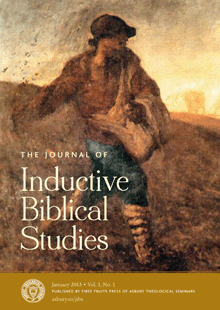 Earlier this year I noted the premiere of a new journal, the Journal of Inductive Biblical Studies. The second issue is out now, and among the essays published there I especially enjoyed the autobiographical piece by David Bauer entitled, “My Journey with Inductive Bible Study.”
Earlier this year I noted the premiere of a new journal, the Journal of Inductive Biblical Studies. The second issue is out now, and among the essays published there I especially enjoyed the autobiographical piece by David Bauer entitled, “My Journey with Inductive Bible Study.”
Bauer was one of my first Bible professors at Asbury Seminary (and the journal’s editor, Fred Long, was actually the T.A. in that class on Matthew’s gospel in 1991). Years later, I’m still using and teaching a lot of the techniques he taught under the heading of “English Bible,” a form of close reading that occupies an interesting position between the academy and serious lay Bible study. It goes by different names in different traditions: “Bible Exposition,” “inductive Bible study,” etc. Bauer taught directly from Matthew, with support from Robert Traina’s book Methodical Bible Study. I admit I struggled with the tone of Traina’s book, and only warmed up to it very gradually. Fortunately, Bauer has brought out a new volume, Inductive Bible Study, co-authored with Traina and effectively replacing it in a way that will commend it to the next generation.
If this is beginning to sound like a mash note to former teachers, it’s because that’s what Bauer’s “My Journey” essay is, also. Tracing a little of the lineage that came down to him, Bauer relays a report from Ralph Thompson about Howard Tillman Kuist’s teaching of English Bible at Winona Lake School of Theology: “at the end of one day of instruction, the students were so overwhelmed by the power of the message of Jeremiah that all of them were unable to move from their seats for a half hour after the class ended.”
Friends, that is some serious Bible teaching!
Bauer gives his own testimony to Traina’s teaching at Asbury Theological Seminary. He says of his first class with Traina, “Every aspect of the course—both inside and outside the classroom—was meticulously planned, one might say almost choreographed. And yet the class felt free and fresh.” He also admits –something I never heard him admit when he was using the book in his courses– that it wasn’t love at first sight for him and the Traina book:
as an undergraduate I had found Methodical Bible Study to be a bit dry and pedantic. My enthusiasm was also somewhat dampened by the fact that the inductive Bible study classes Dr. Traina taught were named “English Bible” courses; I wanted to work seriously with the original languages.
But after actually internalizing the inductive method, with its diagramming, relationship-naming, and attention to structure, Bauer became a lifelong advocate of its potential. In fact, he says, “it became clear to me the very first day that “English Bible” did not mean “dumbed down.”
It seems to me that for most people Inductive Bible study, under whatever name, still gives off a whiff of amateurism, a suggestion of down-market or sub-academic engagement with Scripture. On the one hand, I would gladly embrace the stigma of spreading Biblical investigation to a broad audience of serious Christians, of propagating rigor without demanding expertise. If this be stigma, I aspire to be stigmatic. On the other hand, with practitioners like Dr. Bauer involved in it, it can hardly be called non-academic. It helps to know that Bauer is one of the most well-read professors I ever took a class with, and that when he turns to English Bible it is with full knowledge of the other approaches available in the methodological toolkit of Biblical Studies as practiced in the modern academy. But it also helps that Bauer has given some attention to tracing the pedigree of the movement, and it goes back to academic royalty of no mean rank:
Part of my sense of calling to inductive Bible study has been to help make the inductive approach known within the academic biblical guild. I hope that my dissertation and my other academic publications have assisted in the accomplishment of this goal. People often, and perhaps even typically, associate inductive Bible study with non-specialist lay reading of the Bible. They fail to realize that inductive Bible study emerged from the work of William Rainey Harper, a Yale Professor of Old Testament and the founding president of the University of Chicago and his associate and student Wilbert Webster White, a Yale-trained Semitist and Old Testament scholar, and the founder of a significant theological seminary, The Biblical Seminary in New York. Nor do they realize that inductive Bible study has been taught at such prestigious institutions as Princeton Theological Seminary, Union Theological Seminary in Virginia, and Fuller Theological Seminary. Inductive Bible study continues to have a significant contribution to make to the academy. And generations of students, both from Asbury and elsewhere, testify it its value in professional ministry, pointing to its importance in seminary curricula.